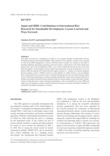Japan and IRRI: Contributions to International Rice Research for Sustainable Development, Lessons Learned and Ways Forward
Japan Agricultural Research Quarterly
| ISSN | 00213551 |
|---|---|
| NII recode ID (NCID) | AA0068709X |

Full text
jarq55-5_483-487.pdf260.21 KB
This paper reviewed the contributions of Japan to rice research through its partnership with the International Rice Research Institute (IRRI), which started in 1960. Japanese scientists were seconded to work at the IRRI headquarters or hired as full-time staff to conduct rice research in the fields of breeding, pathology, physiology, agronomy, and social sciences. Among them is Dr. Akira Tanaka who played a key role in the development of IR8, a rice variety credited for paving the way for the first Green Revolution. To disseminate research outputs from agronomic research on rainfed rice in Asia to farmers, IRRI developed an ICT-based decision support systems (i.e. weather-rice-nutrient integrated decision support system or WeRise) which are ideal platform to enable farmers to access database from various fields of rice research. These web-based technologies are also accessible through mobile devices. Web-based technologies can help accumulate big data that can be used to promote data-driven solutions and enable informed decision-making to help rice farmers adapt to current and future climate. Analysis of big data from various web-based technologies is still a researchable area where IRRI and Japan can work together to exploit valuable information from past researches and further contribute to sustainable development through rice research.
| Date of issued | |
|---|---|
| Creator | Yoichiro KATO Keiichi HAYASHI |
| Subject | CGIAR Green revolution decision support systems |
| Publisher | Japan International Research Center for Agricultural Sciences |
| Received Date | 2020-12-11 |
| Accepted Date | 2021-07-26 |
| Volume | 55 |
| 号 | Special Issue |
| spage | 483 |
| epage | 487 |
| Language | eng |
